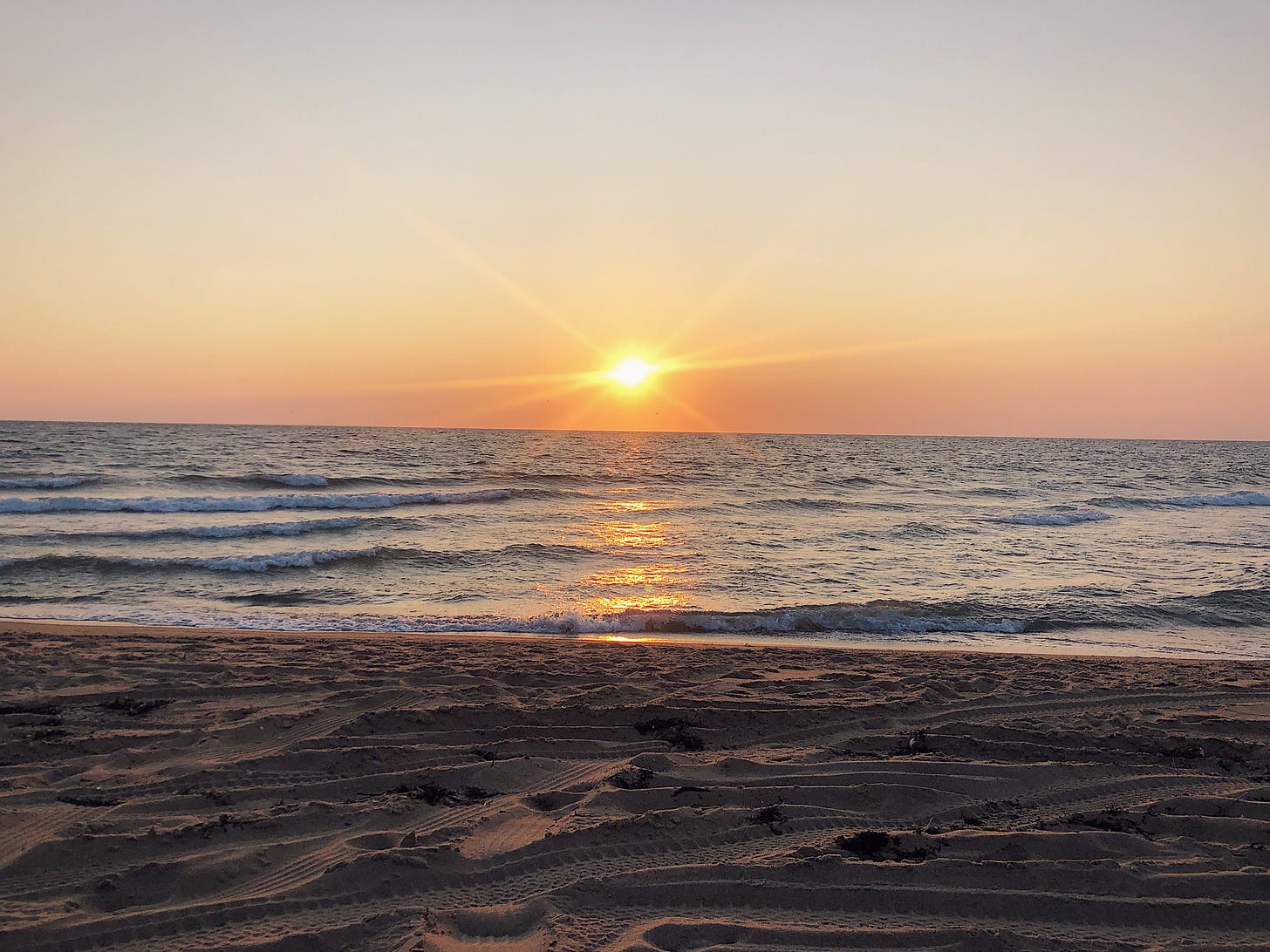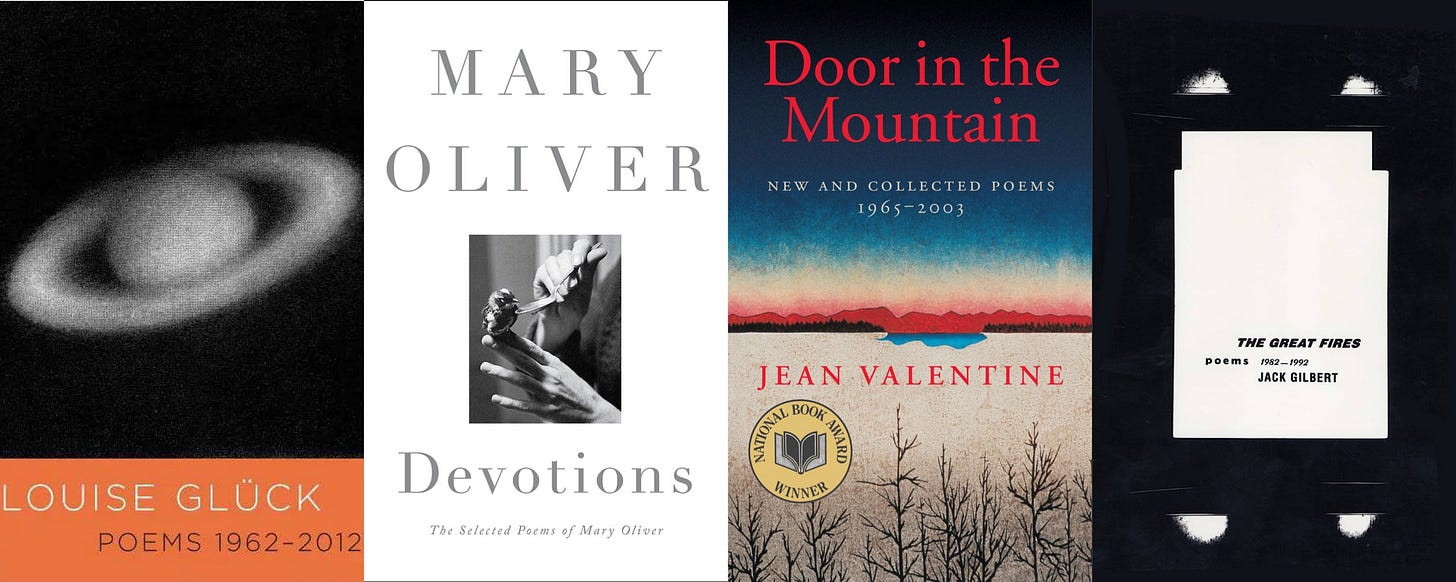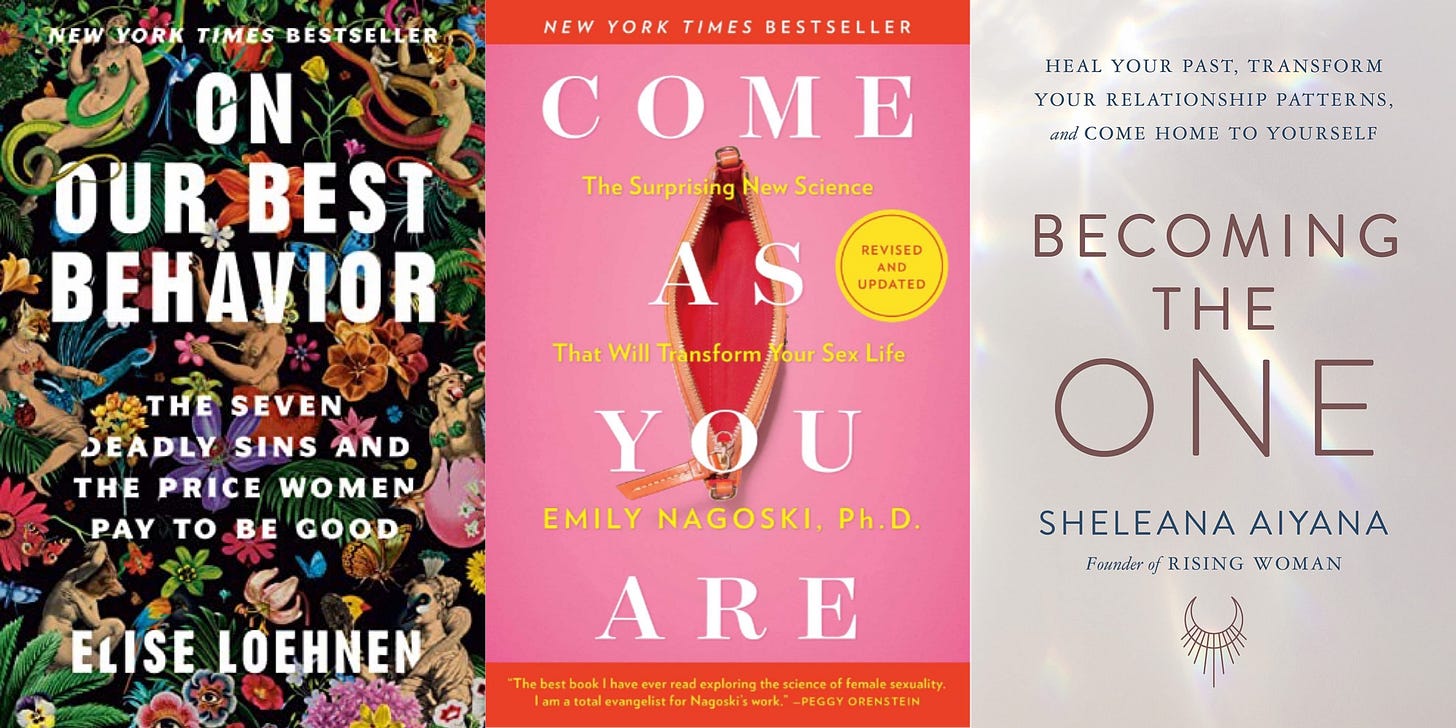Red Hot Summer Reading List
How TBR lists are kind of like sex, "cool girl syndrome", and loving past versions of self.
Here’s what I’ve got for you today:
My Summer TBR List.
How TBR lists are kind of like sex, "cool girl" syndrome, and loving past versions of self.
Sometimes I feel like to share an honest To Be Read (TBR) list reveals a number of things about me my ego doesn’t want you to know. It’s essentially a list of books I haven’t read though perhaps I “should have” however long ago, what I want to read even if it is not “literary” (hello hours that will be spent reading pop psych and self help), and potentially the very source materials I will draw on in my own work. (There goes any chance of you thinking I arrive at the page a fully formed genius who spins immaculate prose out of thin air!)
To share books I’m truly looking forward to reading is to show you what I care about, and apparently I’m still working on being okay with that. This is what I find hot, this is what keeps me up at night, this is the level of prose I aspire to. Not all my reading lists are “that deep” and I have made even private lists that were born out of a false sense of obligation to keep up rather than a true reflection of my tastes. But that, I’m glad to finally realize, is not only unrewarding, it’s no fun. Sometimes I am afraid to get older, but in moments like this where my past experiences allow me to see the absurdity of the ego, I think thank god.
To admit your desire to be moved and how is an act of vulnerability—which now that I think about it, isn’t unlike sex. We all want to be fully seen for who we are, to be taken care of, and yet how many women are afraid to say what actually gets us off? We think “is this weird? Will this turn them off? Will asking for this be too much? Will it make them want something easier, more predictable, less needy?” And for those who have made it to the other side to sexually fulfilling relationships, is what we feel now a sense of superiority? Or is it true compassion (not pity or sympathy) for other women and therefore past versions of ourselves who believed in the false binary? (Either you were needy and unlovable, or cool and worthy of what often amounted to the bare minimum in love.)
If you suffered from “cool girl” syndrome, it’s not your fault. At least that’s what I have to keep reminding myself when I feel the urge hide the part of me that ever wanted to be cool. (Because what could be more uncool than wanting to be cool?) Cool girl? Couldn’t be me! Watch me perform earnestness and listen to me overshare! Or wait here as I bulldoze my way through life like the boss bitch I want you to think I am, judging anyone who has ever held a moment’s hesitation in their life. Both ways of being are ridiculous and exhausting, and for my birthday I’d like the universe to bestow upon me the ability to relax.
Suppressing our desires, not just sexually but in our day to day has been conditioned in us. Not just desires that make us feel tough, but desires that force us to see our softness, like wanting to be held and consoled and cared for. We want to ask more from our partners, our jobs, our lives, but we feel that to do so is complaining or being ungrateful or asking too much or rocking the boat or revealing something that would threaten our ideal image of self. This self-policing came before Gone Girl’s chili dogs and culinary gang bangs, and it predates our first faked orgasms, so let’s not be hard on ourselves.
Audre Lorde writes about this suppression in her essay, “Uses of the Erotic: The Erotic as Power” which originally published in 1978.
We have been raised to fear the yes within ourselves, our deepest cravings. For the demands of our released expectations lead us inevitably into actions which will help bring our lives into accordance with our needs, our knowledge, our desires. And the fear of our deepest cravings keeps them suspect, keeps us docile and loyal and obedient, and leads us to settle for or accept many facets of our oppression as women.
The point isn’t to judge ourselves when we are docile and loyal and obedient, but to offer those versions of ourselves compassion and even gratitude for trying to keep us safe. Then to orient ourselves towards something better, more fulfilling. Not just in sex, though the erotic can and does pertain to that, but in the day to day things that make up the sum total of our lives. Because as Lorde illustrates, the erotic is also wisdom and power and freedom. I’m not trying to eradicate the cool girl, but I want her to know she doesn’t run the show anymore.
Did I think I would end up comparing my summer reading list to sex when I sat down to write this? No, but here we are.
Anyway, I picked these books because at one point or another in the past two years, either the book or the author has been recommended to me by a reader and writer I admire and trust. The themes may be wide-ranging, but in general I look for love in everything I read.
GENERAL VIBES:
a sense of longing that is sweltering
so smart that I’m like, “how?”
a play by play on how to live a less exhausting (and therefore more authentic) life
striking
moving
thoughtful
Fiction
From left to right
The Love Songs of W.E.B. Du Bois - by Honoree Fanonne Jeffers:
From an early age, Ailey fights a battle for belonging that's made all the more difficult by a hovering trauma, as well as the whispers of women--her mother, Belle, her sister, Lydia, and a maternal line reaching back two centuries--that urge Ailey to succeed in their stead. To come to terms with her own identity, Ailey embarks on a journey through her family's past, uncovering the shocking tales of generations of ancestors--Indigenous, Black, and white--in the deep South. In doing so Ailey must learn to embrace her full heritage, a legacy of oppression and resistance, bondage and independence, cruelty and resilience that is the story--and the song--of America itself.
The Transit of Venus by Shirley Hazzard:
The Transit of Venus follows Caroline and Grace Bell as they leave Australia to begin a new life in post-war England. From Sydney to London, New York, and Stockholm, and from the 1950s to the 1980s, the two sisters experience seduction and abandonment, marriage and widowhood, love and betrayal.
As Napoleon's army invades, Tolstoy brilliantly follows characters from diverse backgrounds--peasants and nobility, civilians and soldiers--as they struggle with the problems unique to their era, their history, and their culture. And as the novel progresses, these characters transcend their specificity, becoming some of the most moving--and human--figures in world literature.
Nel and Sula's devotion is fierce enough to withstand bullies and the burden of a dreadful secret. It endures even after Nel has grown up to be a pillar of the black community and Sula has become a pariah. But their friendship ends in an unforgivable betrayal--or does it end?
Bunny Glenn believes in climate change. But she also likes to get paid. The year is 1998. The Soviet Union is dissolved, the Cold War is over, and Bunny Glenn is a lonely American teenager in Azerbaijan with her Foreign Service family. Through Bunny's bemused eyes, we watch global interests flock to her temporary backyard for Caspian oil and pipeline access, hearing rumbles of the expansion of the American security state and the buildup to the War on Terror. We follow Bunny from adolescence to middle age--from Baku to Athens to Houston--as her own ambition and desire for comfort lead her to a career in the oil industry, eventually returning to the scene of her youth, where slippery figures from the past reappear in an era of political and climate breakdown.”
Nonfiction
From left to right
Owner of a Lonely Heart by Beth Nguyen:
At the end of the Vietnam War, when Beth Nguyen was eight months old, she and her father, sister, grandmother, and uncles fled Saigon for America. Beth's mother stayed--or was left--behind, and they did not meet again until Beth was nineteen. Over the course of her adult life, she and her mother have spent less than twenty-four hours together. Owner of a Lonely Heart is a memoir about parenthood, absence, and the condition of being a refugee: the story of Beth's relationship with her mother.
Sister Outsider by Audre Lorde:
In this charged collection of fifteen essays and speeches, Lorde takes on sexism, racism, ageism, homophobia, and class, and propounds social difference as a vehicle for action and change. Her prose is incisive, unflinching, and lyrical, reflecting struggle but ultimately offering messages of hope.
A gripping set of stories about the forces that shape girls and the adults they become. A wise and brilliant guide to transforming the self and our society. In her powerful new book, critically acclaimed author Melissa Febos examines the narratives women are told about what it means to be female and what it takes to free oneself from them.
God, Human, Animal, Machine: Technology, Metaphor, and the Search for Meaning by Meghan O’Gieblyn:
For most of human history the world was a magical and enchanted place ruled by forces beyond our understanding. The rise of science and Descartes's division of mind from world made materialism our ruling paradigm, in the process asking whether our own consciousness--i.e., souls--might be illusions. Now the inexorable rise of technology, with artificial intelligences that surpass our comprehension and control, and the spread of digital metaphors for self-understanding, the core questions of existence--identity, knowledge, the very nature and purpose of life itself--urgently require rethinking.
Note: I am intimidated and inspired by the brain of every writer on this list.
Poetry
From left to right
I’ll have these in rotation not just this summer but probably for the rest of the year.
Spirituality and Self-Healing
From left to right
On Our Best Behavior: The Seven Deadly Sins and the Price Women Pay to Be Good by Elise Loehnen
Come As You Are: The Surprising New Science That Will Transform Your Sex Life by Emily Nagoski
Becoming The One: Heal Your Past, Transform Your Relationship Patterns, and Come Home To Yourself by Sheleana Aiyana
There’s so much to learn from self-help—including concision and clarity. All you have to read is the title and you know exactly what the book is about!
As I’m about to publish this list, my ego rolls its eyes. “What about the fact that you balled your eyes out reading One True Loves by Taylor Jenkins Reid two weeks ago? Or the fact that you binged The Summer I Turned Pretty and Ginny and Georgia? Or that basically all of April you spent reading self-help parenting books and not a single novel? Who do you think you’re fooling???” But if you’re on this mailing list, you probably already know what’s up.
Bonus: Journal Prompts For Your Inner Cool Girl
Overthinking a reading list might seem silly to folks who aren’t huge readers, but you can replace “reading” with any other activity you consider yourself to have better-than-average taste in. Maybe it’s music, clothes, cars, interior design, cookware, coffee, wine, TV, movies, sports. The “thing” doesn’t matter so much as the fact that it’s a part of your identity, something you pride yourself in.
Do you sometimes adjust what you like when you’re around certain people in order to prove you have good taste?
Do you dread when someone says “oh, you’ve never heard of ______?”
Are you the kind of person who says that to other people?
Are you afraid of being seen as soft/emotional/cringey?
Mainstream/trite/unoriginal/basic?
Behind/late/inexperienced/sheltered/unworldly?
Do you pretend to be unbothered when you’re actually, in fact, very bothered?
Do you chastise yourself for feeling upset?
When was the last time you judged someone? Without rationalizing or being hard on yourself, what was it that you judged and why?
What are you afraid will happen if you let go of control?






